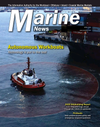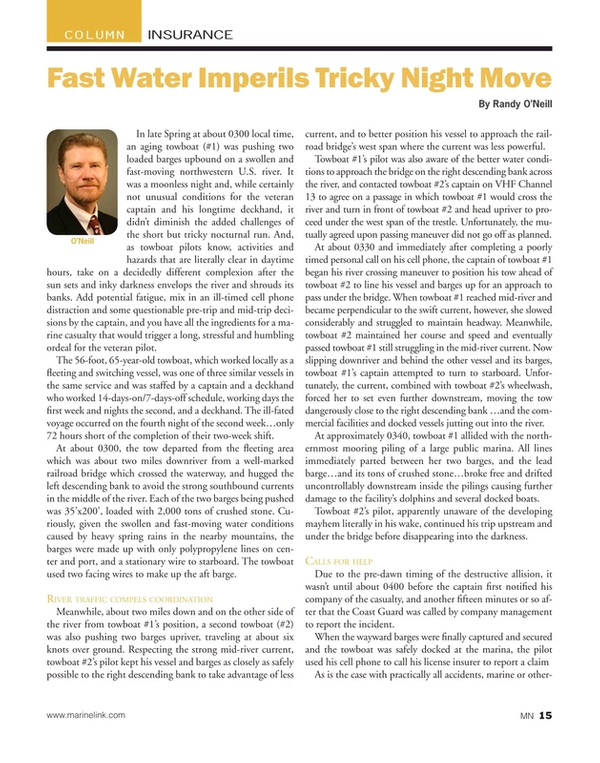
Fast Water Imperils Tricky Night Move
In late Spring at about 0300 local time, an aging towboat (#1) was pushing two loaded barges upbound on a swollen and fast-moving northwestern U.S. river. It was a moonless night and, while certainly not unusual conditions for the veteran captain and his longtime deckhand, it didn’t diminish the added challenges of the short but tricky nocturnal run. And, as towboat pilots know, activities and hazards that are literally clear in daytime hours, take on a decidedly different complexion after the sun sets and inky darkness envelops the river and shrouds its banks. Add potential fatigue, mix in an ill-timed cell phone distraction and some questionable pre-trip and mid-trip decisions by the captain, and you have all the ingredients for a marine casualty that would trigger a long, stressful and humbling ordeal for the veteran pilot.
The 56-foot, 65-year-old towboat, which worked locally as a fleeting and switching vessel, was one of three similar vessels in the same service and was staffed by a captain and a deckhand who worked 14-days-on/7-days-off schedule, working days the first week and nights the second, and a deckhand. The ill-fated voyage occurred on the fourth night of the second week…only 72 hours short of the completion of their two-week shift.
At about 0300, the tow departed from the fleeting area which was about two miles downriver from a well-marked railroad bridge which crossed the waterway, and hugged the left descending bank to avoid the strong southbound currents in the middle of the river. Each of the two barges being pushed was 35’x200’, loaded with 2,000 tons of crushed stone. Curiously, given the swollen and fast-moving water conditions caused by heavy spring rains in the nearby mountains, the barges were made up with only polypropylene lines on center and port, and a stationary wire to starboard. The towboat used two facing wires to make up the aft barge.
River traffic compels coordination
Meanwhile, about two miles down and on the other side of the river from towboat #1’s position, a second towboat (#2) was also pushing two barges upriver, traveling at about six knots over ground. Respecting the strong mid-river current, towboat #2’s pilot kept his vessel and barges as closely as safely possible to the right descending bank to take advantage of less current, and to better position his vessel to approach the railroad bridge’s west span where the current was less powerful.
Towboat #1’s pilot was also aware of the better water conditions to approach the bridge on the right descending bank across the river, and contacted towboat #2’s captain on VHF Channel 13 to agree on a passage in which towboat #1 would cross the river and turn in front of towboat #2 and head upriver to proceed under the west span of the trestle. Unfortunately, the mutually agreed upon passing maneuver did not go off as planned.
At about 0330 and immediately after completing a poorly timed personal call on his cell phone, the captain of towboat #1 began his river crossing maneuver to position his tow ahead of towboat #2 to line his vessel and barges up for an approach to pass under the bridge. When towboat #1 reached mid-river and became perpendicular to the swift current, however, she slowed considerably and struggled to maintain headway. Meanwhile, towboat #2 maintained her course and speed and eventually passed towboat #1 still struggling in the mid-river current. Now slipping downriver and behind the other vessel and its barges, towboat #1’s captain attempted to turn to starboard. Unfortunately, the current, combined with towboat #2’s wheelwash, forced her to set even further downstream, moving the tow dangerously close to the right descending bank …and the commercial facilities and docked vessels jutting out into the river.
At approximately 0340, towboat #1 allided with the northernmost mooring piling of a large public marina. All lines immediately parted between her two barges, and the lead barge…and its tons of crushed stone…broke free and drifted uncontrollably downstream inside the pilings causing further damage to the facility’s dolphins and several docked boats.
Towboat #2’s pilot, apparently unaware of the developing mayhem literally in his wake, continued his trip upstream and under the bridge before disappearing into the darkness.
Calls for help
Due to the pre-dawn timing of the destructive allision, it wasn’t until about 0400 before the captain first notified his company of the casualty, and another fifteen minutes or so after that the Coast Guard was called by company management to report the incident.
When the wayward barges were finally captured and secured and the towboat was safely docked at the marina, the pilot used his cell phone to call his license insurer to report a claim.
As is the case with practically all accidents, marine or otherwise, there was no one single cause to this casualty, but several glaring contributing factors. Fatigue and cell phone distraction were indeed possible, but the more troubling tandem: the decision to use polypropylene lines to secure the tow for the short but challenging trip; and the pilot’s decision to pass ahead of an upbound tow while crossing a river in strong current during high water conditions stood out as the most egregious.
The USCG hammer comes down
Not surprisingly, Coast Guard investigators focused on those two dubious decisions made by the captain.
Understanding the pilot’s real exposure to Suspension & Revocation (S&R) proceedings, his license insurer-assigned maritime attorney met at length with his client to prepare him to make an initial statement to USCG investigators and to complete and submit a CG2692 Marine Casualty Report form. Ten days later, the captain was notified by investigators to attend a formal interview to discuss the by now high-profile incident at the local USCG office. He attended that crucial interview with his maritime attorney by his side.
At that tense meeting, it became clear very quickly that investigators were very concerned about the captain’s poorly timed cell phone call immediately prior to his attempt to cross a river running at over a foot above flood level, and the decision to use polypropylene line rather than steel wire and ratchets to secure his barges given the fast-moving water.
But USCG investigators saved their harshest criticism for the captain’s failure to recognize the unique hazards posed by attempting to traverse the river to execute a nighttime passing maneuver in extremely high current conditions. Investigators were strongly suggesting those decisions in the aggregate warranted negligence charges and significant penalties.
Sensing what he believed was coming, the captain’s veteran maritime attorney promptly met with Coast Guard investigators to see if they might be receptive to making a Settlement Offer to spare his client an Administrative Court date. After lengthy consideration, which included a thorough review of the captain’s professional sailing history serving under his license, an offer was made.
The USCG offered an outright suspension of the captain’s license for six months, remitted to serving two months with an additional four-month probationary period. Also mandated in the offer was a requirement for the captain to enroll in and successfully complete a Bridge Team Management course of 24 hours or more in duration before his license would be returned to him
In view of the unknown consequences of an S&R proceeding (particularly in light of the severe terms of the Settlement Offer), after consulting with his attorney the captain agreed to accept the terms of the Settlement Offer and surrendered his Master’s license to the Coast Guard for a minimum of 60 days.
As with all compromises, neither side got everything it wanted, but the captain served his two-month penalty ‘on the beach’, completed the mandatory course and successfully completed his 120-day probationary period without any further reportable incidents.
As agreed upon, his Master’s license was returned after two months.
Today, the chastened towboat pilot is still working the rivers, and hopefully using considerable more caution when making critical decisions that can negatively impact his license, livelihood and professional reputation.
Read Fast Water Imperils Tricky Night Move in Pdf, Flash or Html5 edition of April 2020 Marine News
Other stories from April 2020 issue
Content
- By the Numbers: Small Shipyard Grants page: 08
- Interview: Todd Thayse, Fincantieri Bay Shipbuilding page: 12
- Fast Water Imperils Tricky Night Move page: 15
- Big City Fireboats page: 20
- Autonomy on Trial page: 28
- US Shipyards Forge Ahead Through COVID-19 page: 36
- Profiles in Training: American Seafoods page: 40


